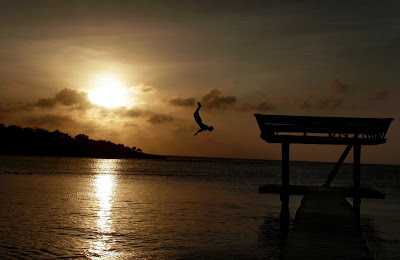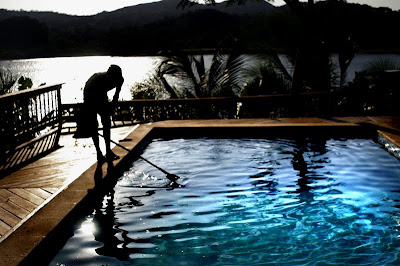
On April 12th, 1797, around 3,000 Garifuna tribesmen and women landed on Roatan Island after losing a century-long war with the British army. The once  native people to the region of Lesser Antilles had been living amongst (but segregated from) the Amerindian tribes that occupied that region and others like San Vincente. The British army, which was also receiving funding from the French, distinguished that it was only the "Black Carib's" that had to vacate, and not those who belonged to the "Red or Yellow Carib's." Around 5,000 Garifuna were packed into a series of ships and sent to the island of Roatan, only half survived the journey. Landing on a region of the island named Punta Gorda, a large majority of "Islanders" live there now, however their diaspora reaches to almost every end of Roatan and the smaller islands of Utila, Guanaja, Cayos Cochinos and many other areas around along the Caribbean coastline.
native people to the region of Lesser Antilles had been living amongst (but segregated from) the Amerindian tribes that occupied that region and others like San Vincente. The British army, which was also receiving funding from the French, distinguished that it was only the "Black Carib's" that had to vacate, and not those who belonged to the "Red or Yellow Carib's." Around 5,000 Garifuna were packed into a series of ships and sent to the island of Roatan, only half survived the journey. Landing on a region of the island named Punta Gorda, a large majority of "Islanders" live there now, however their diaspora reaches to almost every end of Roatan and the smaller islands of Utila, Guanaja, Cayos Cochinos and many other areas around along the Caribbean coastline.
 native people to the region of Lesser Antilles had been living amongst (but segregated from) the Amerindian tribes that occupied that region and others like San Vincente. The British army, which was also receiving funding from the French, distinguished that it was only the "Black Carib's" that had to vacate, and not those who belonged to the "Red or Yellow Carib's." Around 5,000 Garifuna were packed into a series of ships and sent to the island of Roatan, only half survived the journey. Landing on a region of the island named Punta Gorda, a large majority of "Islanders" live there now, however their diaspora reaches to almost every end of Roatan and the smaller islands of Utila, Guanaja, Cayos Cochinos and many other areas around along the Caribbean coastline.
native people to the region of Lesser Antilles had been living amongst (but segregated from) the Amerindian tribes that occupied that region and others like San Vincente. The British army, which was also receiving funding from the French, distinguished that it was only the "Black Carib's" that had to vacate, and not those who belonged to the "Red or Yellow Carib's." Around 5,000 Garifuna were packed into a series of ships and sent to the island of Roatan, only half survived the journey. Landing on a region of the island named Punta Gorda, a large majority of "Islanders" live there now, however their diaspora reaches to almost every end of Roatan and the smaller islands of Utila, Guanaja, Cayos Cochinos and many other areas around along the Caribbean coastline.
This day is their Independence Day. But the connotations of "blaze
 and glory" we associate with our Fourth of July isn't a shared sentiment amongst these people. What they celebrate is the preservation and and the general adoration for their ancestors. Their legends are full of myth, lore, and mysticisms. An oral history of ghosts and tokens remain vibrant to this day.
and glory" we associate with our Fourth of July isn't a shared sentiment amongst these people. What they celebrate is the preservation and and the general adoration for their ancestors. Their legends are full of myth, lore, and mysticisms. An oral history of ghosts and tokens remain vibrant to this day.This celebration was small in nature but it was fascinating to witness the
 traditional dances with the inherent garb. Garifuna-style food was made (many dishes included iguana), and children commandeered their parents dory's once the landing had commenced. What I enjoy most about cultural events like this is that they are rare to the Western eye. With our own Black heritage in the U.S., little if anything is taught about the Garifuna or Black Carib's. Theirs is a culture of suffering which continues to this very day. They are impoverished, and their island home is being taken away from them... quickly.
traditional dances with the inherent garb. Garifuna-style food was made (many dishes included iguana), and children commandeered their parents dory's once the landing had commenced. What I enjoy most about cultural events like this is that they are rare to the Western eye. With our own Black heritage in the U.S., little if anything is taught about the Garifuna or Black Carib's. Theirs is a culture of suffering which continues to this very day. They are impoverished, and their island home is being taken away from them... quickly. Hey everyone,
Hey everyone,








